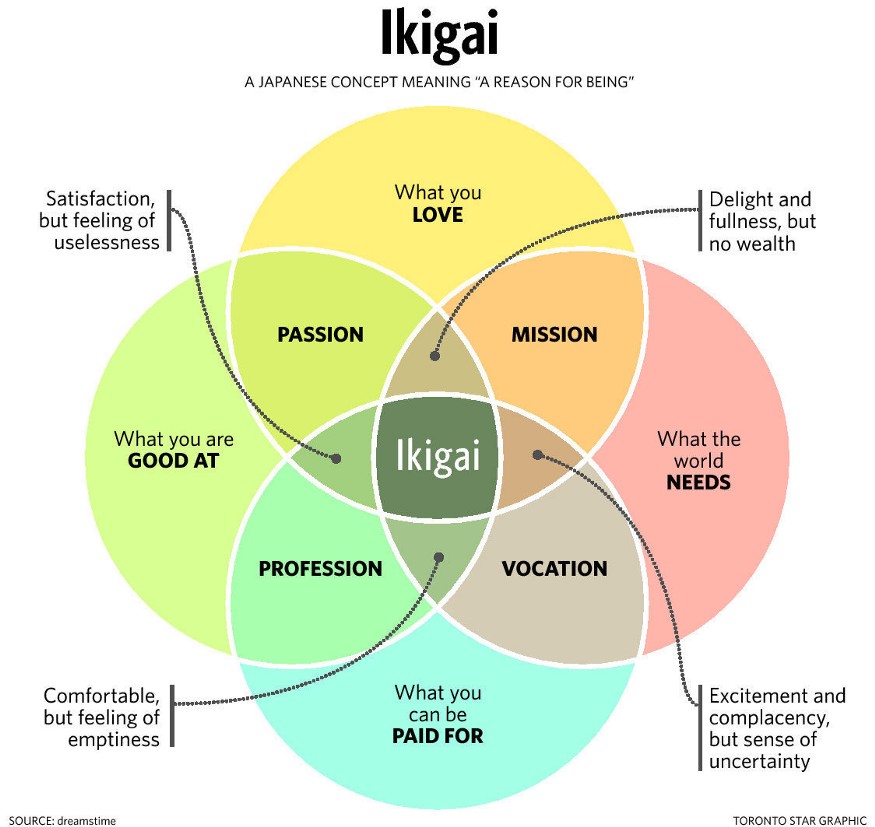I have always incorporated the concept of Ikigai and career coaching, although when I started doing this many years ago, I didn’t understand at the time that this was what I was actually doing. My approach has always been holistic and to avoid to siloed thinking. Our professional and personal goals not separate and unrelated and long experience has taught me that if someone is unhappy in one area of their lives, it bleeds into another to cause imbalance. At the heart of Ikigai is that everything is connected.
Ikigai is a Japanese concept which is synonymous with “a reason for being.” The word “ikigai” suggests the source of value in your life or the things, that makes your life worthwhile. The English translation would be “the thing that you live for” or “the reason for which you wake up in the morning.”
Hector Garcia, the co-author with Francesc Miralles of Ikigai: The Japanese Secret to a Long and Happy Life says. “Your ikigai is at the intersection of what you are good at and what you love doing,”
This balance is found at the point where your passions and talents converge with the things that the world needs and is willing to pay for.
The book identifies 10 rules for finding your own Ikigai
1. Stay active and don’t retire
2. Leave urgency behind and adopt a slower pace of life
3. Only eat until you are 80 per cent full
4. Surround yourself with good friends
5. Get in shape through daily, gentle exercise
6. Smile and acknowledge people around you
7. Reconnect with nature
8. Give thanks to anything that brightens our day and makes us feel alive.
9. Live in the moment
10. Follow your ikigai
Why are Ikigai and career coaching intertwined?
In any career reflection we all need to ask ourselves 4 main questions. When you have answered those questions and your responses are aligned, you will feel most fulfilled. They are:
- Knowing what you love (your passion) — Feeling passionate about your life and work.
- Pursuing what you are good at (your vocation) — Fully utilizing your talents.
- Engaging in what will pay you (your profession) — Knowing what others are willing to pay you to do.
- Understanding what the world (market) needs (your mission) — Understanding what others need.
Question1 – what do I love doing?
One of the most regularly doled out of all career tips is to follow your passion. If it was a movie or a song it would get an award. Of course you should all be advised to do something you love and which satisfies you. Otherwise you will be condemned to a life of frustration and misery. But there are some caveats.
Passion isn’t static for most people. It’s misleading to suggest it might be and to follow it blindly. I had this perfect reminder in a tweet from Mouneer Rabie quoting Professor Scott Galloway
A no-bullshit piece of advice by @profgalloway pic.twitter.com/7uC2MWBdcZ
— mouneer rabie (@mouneer) December 25, 2020
Your passion can change over the years. So something that you might be passionate about in your 20s, can be the source of unremitting boredom in later life.
You can also develop new passions. It’s not inconceivable that you might find two or even more passions in a working life which is extending all the time.
Passion on its own is not enough!
Question 2: What am I good at?
The next step involves strategy, which brings us to question 2. Do you have the skills or can you acquire them? What are you good at?
It’s important to constantly assess our skills, strengths and development needs because these are changing or we need to update them. The days of anyone having a fixed retirement date when they kick back and head for the golf course or world travel are probably a thing of the past for all but a few. It’s projected that most people will now be working until they are 70, health permitting.
It’s important that we all recognise our strengths and skills and what we need to work on. If in doubt – ask for feedback.
Question 3: What can I do to earn money to pay my bills
At the age of 14, I was passionate about tennis, but there was no way I could make a living at it. Or had the skills. That is something that very often people misunderstand. I know one woman who was an excellent home cook and passionate about food. But she was unable to turn that passion into something that paid her bills. Some things like my tennis, are best kept as hobbies.
In times of crisis many have had to take jobs they are not passionate about to put good on their table and keep a roof over their heads. They should not be judged for that, but eventually they will probably find themselves out of alignment with their core values and other drivers.
This will be the same for someone who earns a high salary but feels unfulfilled. This suggests one or more of their other needs are not being met.
Question 4. What does the world or market need?
This is going to be one of the greatest challenges of the next normal. As our workplaces reshape we are going to need to keep abreast of new trends to sell our skills in a new employment market place. We need to know more than ever what our workplaces need. This will mean staying in touch and in tune with workplace innovation and making sure we have the right skills to find our place in it. The pace of change is also so great in our workplaces, that we have no idea what jobs will exist in 10 years that we may become passionate about.
One of the under valued soft skills that contributes to career success is a sense of curiosity. Not only that, it is an age neutral attribute. It can work in every age demographic, from entry-level to seniors, which is always an added bonus. A sense of curiosity can be understood as:
“A state of active interest or genuinely wanting to know more about something.”
Continuous and intuitive learning will be very much part of our career management strategies over the next decades.
Core advice
Core advice around this is to maintain a path of ongoing self-assessment and life-long learning. Be curious and open to possibilities and be sure to do your inner work regularly to find your Ikigai. Assess and prioritize your goals. In our careers we will be passionate about many things at various times. At different stages of our lives we have a range of commitments and constraints which may cause us to be thrown our of alignment. There is nothing wrong with having to accept that in the short term and adjust later. The most important element is that you are aware of what is going on.
As life goes on compromises are made as we factor other people’s needs into our planning. The question is do you feel compromised? If you do, then it’s time for a re-evaulation.
This is also why generic career advice doled out with no any real thought to context can miss the mark. We need a holistic and more inclusive approach to career management and recognise that there are a range of cultural, personality and gender differences where a one size fits all style simply won’t work. As working practices change to adapt to the global pandemic finding balance will become even more significant as the line between working from home and living at work becomes blurred.
The most important thing is to make your career management strategy ongoing and not wait until there is an emergency. To quote Benjamin Franklin “Failing to prepare is preparing to fail”
If you need career support for your next steps get on touch NOW! Don’t wait until you have a crisis.






